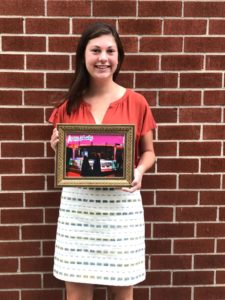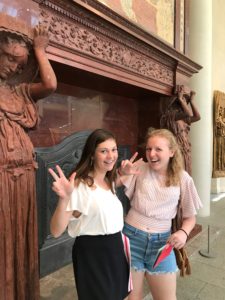Cates Saleeby: Art Law in the Big Apple

Coming from the small town of Florence, South Carolina, Vanderbilt senior Cates Saleeby always knew she wanted a welcoming, but academically demanding, university where she could step out of her comfort zone. Describing it as “challenging” but also “friendly and fun,” Saleeby decided Vanderbilt was the place to do exactly that.
In high school, a cherished teacher introduced Saleeby to her love of classical languages, particularly Latin. This would later encourage Saleeby to pursue her double major in Classics and Mediterranean Studies and Medicine, Health, and Society. Through her Classics courses and an archaeological dig in Israel, Saleeby discovered a newfound love beyond languages – artifact repatriation. Saleeby, who plans to attend law school after graduation, saw how she could potentially help return stolen artifacts to their native countries through a career in art law.
When she learned about an internship at the Center for Art Law in Brooklyn, New York, it felt like the perfect opportunity to explore the intersection of her passion for art history with her legal interests. The Center for Art Law is a small nonprofit that works on the aggregation of resources, educational events, and scholarly articles for the field of art law. Encouraged by her previous experience interning with the Tennessee Justice Center, Saleeby knew she had what it took to make a difference in her internship.
“Even though I was working in a different category [of law] in the new summer, the past summer’s experience taught me about the field and let me practice my analytical writing. That prepared me for the Center for Art Law, where I did a lot of scholarly writing, research, and editing.”
Saleeby’s responsibilities at the Center for Art Law included sitting in on court cases, assisting with legal research, marketing, planning events, and researching and writing scholarly articles, which the Center even published on its blog. She cites her experience planning the inaugural Art and Law Auction fundraiser as one of the proudest accomplishments of her internship.
“I got to plan basically a whole art auction – everything from all of the materials that promoted it, to hanging the art work in the gallery, to serving people during the auction. It was great,” said Saleeby.

Over her four years at the university, Saleeby states that these experiential learning opportunities have affirmed her love for the Classics.
“… I really wanted to explore how that field is alive right now and how it’s still helping people, helping other populations, helping cultures reclaim things that mean things to them,” she said.
The hands-on experience Saleeby gained during her internships also help to inform her career goals and decision to pursue art law professionally.
“I think it really confirmed to me that this weird, niche area of law that I was interested in is a really viable career field,” Saleeby exclaimed. “And, even though it is small, there’s a place for me there, and I would really love to be a part of it.”
Reflecting back on her experiences as a Vanderbilt student, Saleeby offers advice to those first year and sophomore students who are getting ready to plan their own experiential learning opportunities.
“Don’t be afraid to just reach out and ask questions. Whether that’s to a professor or to an older student or to someone on the internet on a website that says ‘Send all inquiries to this email address,’” she explained. “Do not be afraid to send that email and have confidence that you can add value to whatever you’re a part of and that other people will appreciate that.”
